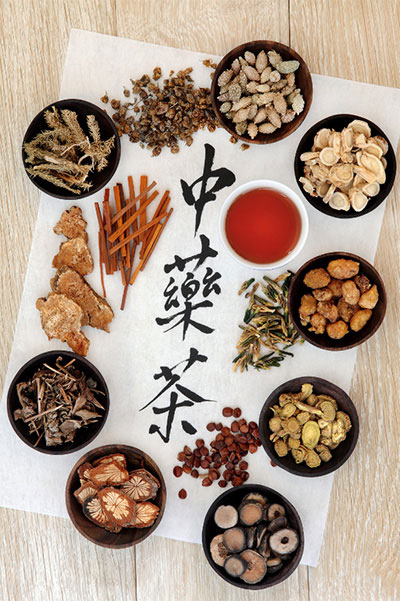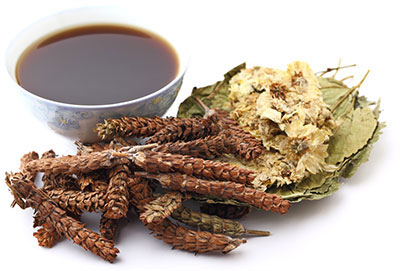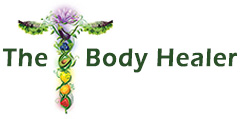Chinese Herbalism
Oriental medicine features the largest and most complex herbal healing system in the world. For over 3,000 years, plant, animal, and mineral substances have been studied and their medicinal effects recorded in the Chinese medical texts (Materia Medica). Many of these herbs have a very powerful effect on the body, and the herbalist will recommend either a single herb or a formula that includes several different herbs based on the health condition being treated.
Chinese herbalism is one of the four pillars of Oriental medicine:
![]() Acupuncture
Acupuncture ![]() Chinese Herbalism & Nutrition
Chinese Herbalism & Nutrition ![]() Chinese Massage & Manipulation (Tui Na)
Chinese Massage & Manipulation (Tui Na) ![]() QiGong
QiGong

All 4 branches incorporate Chinese herbs in their healing techniques. Nutritional advice is also part of the treatment, and specific foods and cooking methods are recommended based on the Oriental medicine principles of Yin/Yang and the 5 elements. The dietary advice is often very different to the advice given by traditional western nutritionists. Being well-fed is considered very important and the recommended foods are considered fulfilling and exciting.
Yin/Yang, Qi, & the 5 elements
In China, there are more than 5,000 herbal, mineral, and animal extracts, and over 500 different formulas that contain them. These include over 76 glandular extracts from the human placenta. The Materia Medica is a continually evolving medical text that includes information on the usage, dosage, and contraindications for each herb and formula, as well as any available information on drug interactions and any conventional medical research or studies that have been published.
In China today, Chinese herbs are used alongside conventional medicine. In Japan, a variation of Chinese herbal medicine known as Kampo has become popular, and the Japanese Health Ministry has approved many Kampo remedies for medical use.
Western vs. Chinese Herbalism
Single Herbs vs. Formulas
The biggest difference between western and Chinese herbalism is that in the west, herbs are often taken as a singular remedy. Chinese herbal medicine makes use of herbal combinations that are not just designed to treat a specific illness, but are tailor-made to the individual based on Oriental medicine principles of restoring balance by addressing the root cause of the problem. This makes Chinese herbalism more complex in its use. By combining herbs, not only is the therapeutic value increased but potential side effects can also be decreased.
Even though a large selection of formulas have been developed, practitioners often modify them to create an individualized formula to address the subtle nuances of the health condition and constitution of their patient.
Diagnosing Conditions
The method of diagnosing health conditions varies greatly between Chinese herbalists and western herbalists. In Oriental medicine, diagnosis is based on an understanding of Yin/Yang, the 5 element theory, and the 8 guiding principles, and how they all relate to the imbalance within the patient.
In Chinese medicine, there is no such thing as treating the actual disease or condition, such as a "headache" or "migraine" or "flu." For example, a flu that results in thick, sticky secretions, along with restlessness and insomnia, is considered an excess of Yang and an herbal formula will be recommended based on this and other characteristics of the body. The factors that created the imbalance within the body are identified and brought back into harmony. A migraine headache in one person may be treated very differently to the migraine headache in another, depending on different characteristics.
As with other forms of Chinese medicine, diagnosis is carried out by listening to the pulse of the blood vessels, observing the body, and asking a series of detailed questions.
Herbal Preparations
 Similar to western herbs, Chinese herbs are prepared in a number of different ways:
Similar to western herbs, Chinese herbs are prepared in a number of different ways:
- Herbal Decoctions
The most traditional method of preparing an herbal formula in China, decoctions can involve lengthy preparation to create "teas" infamous for their strong taste and aroma. For this reason, decoctions are not as popular or as widely used in the west. - Herbal Extracts & Tinctures
This is a more concentrated form of the herb that is extracted by steeping it in either a strong grain alcohol, or in water for 4 to 5 weeks. Sometimes, steeping in alcohol is required to extract the active ingredients in the herb. The extract or tincture is then taken depending on the number of "drops." Some find this much easier than taking a pill or capsule. This is often the case with pets or children. Measuring drops into empty gelatin capsules is a great way to take an extract or tincture that tastes too strong or bitter. There are three standard sizes: 000, 00, and 0, with 00 being the most common size that holds at least 30 drops.
Measuring drops into empty gelatin capsules is a great way to take an extract or tincture that tastes too strong or bitter. There are three standard sizes: 000, 00, and 0, with 00 being the most common size that holds at least 30 drops. - Herbal Powders
These are dissolved in hot water to make a tea and are more convenient to prepare and use as compared to traditional decoctions. They are also not as pungent. They are also available in capsule form. - Syrups
These are soothing liquids taken for coughs and sore throats and are a very convenient way to give herbal formulations to children. - Ointments
Liniments, salves, compresses, and plasters are used when applying herbs externally to the body.
Purity Standards & Safety
Many herbal products sold on the internet from both China and India have been found to contain heavy metals and other dangerous toxic elements such as mercury, arsenic, and lead. It is important to only use herbs from a reputable manufacturer whose products been independently verified by a 3rd party company as being free of these toxins. Chinese herbalists typically choose brands and products from manufacturers who are well-respected, and whose product containers carry a stamp of 3rd party verification stamp.
Similar to western herbs, some of the herbs used in Chinese medicine can interact with drugs, have serious side effects, or be unsafe for people with certain medical conditions or during pregnancy.
Although several herbs have been found to be toxic in a very small number of people, in comparison to the toxic nature of modern pharmaceuticals, they are considered far, far safer.
The "side effects" of a medicated nation...
Finding A Qualified Practitioner
Chinese medicine is a complete system of medicine that includes the study of Chinese herbs, and its complexity requires many years of training to master. Even though you can choose a "pre-prepared formula" for your health condition from the hundreds available online or in-store, for the most accurate and safest herbal treatment, it is best to visit a qualified Chinese herbalist who will have the experience to correctly diagnose which herbs you will need, and prepare them in the appropriate formula.
Within the US, there are two institutions that regulate the licensing and accreditation of Oriental medicine practitioners:
NCCAOM
The National Certification Commission for Acupuncture & Oriental Medicine (NCCAOM®) is a non-profit organization established to ensure entry-level competency in the practice of acupuncture and Oriental medicine (AOM) through professional certification.
ACAOM
Ask if your practitioner has completed their education at an educational facility accredited by The Accreditation Commission for Acupuncture & Oriental Medicine (ACAOM). This national accrediting agency is recognized by the US Dept. of Education for the accreditation of both master's level certificate and diploma programs, and post-graduate doctoral programs in acupuncture and Oriental medicine.
Healing therapies...
- Oriental medicine (Acupuncture, Chinese Herbalism, Tui Na, QiGong)
- Ayurveda
- Homeopathy
- Bach Flower Remedies



